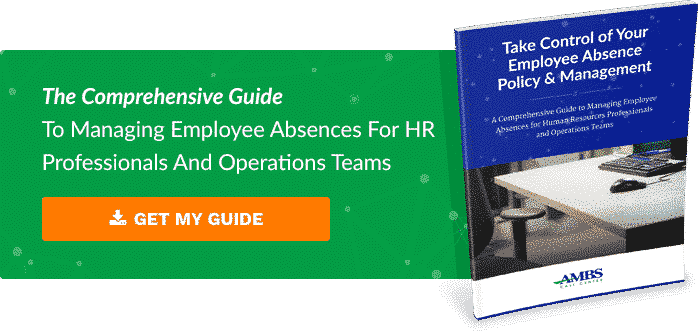9 Ways An Employee Call-Off Hotline Can Reduce Absences
March 7th, 2024 | 5 min. read
By Aaron Boatin

Business management advice blogs and forums are abound with questions about how and why employees abuse their benefits and what can be done about it.
At first glance, there seems to be all sorts of reasons: some workers may want to squeeze in a few more days off after they’ve used their allotted vacation hours. Some simply don’t feel like coming in, some may have substance abuse problems that they try to conceal by taking more time off. Some think they work hard enough or are good enough people that they deserve a shorter week and try to make this happen by routinely taking off Mondays or Fridays.
But one underlying reason why employees seem to cheat the system is simply because they can. Perhaps they’ve tried it once and no one noticed, so they continue their bad behavior. Or if they see other co-workers or even managers taking extra sick days now and then and getting away with it, it further justifies that no one seems to mind.
Want to minimize costs from employee absenteeism? Download our free eBook and take control of your employee absence policy!
Companies that have a weak attendance tracking system system for attendance seem especially vulnerable. If there’s no firm protocol in place for how or when people are supposed to call in sick, or no consequences for doing it incorrectly, it makes it simple for people to not want to put in further effort to notify the right people.
Eventually, you can have a workplace where fudging hours here and there becomes the norm.
Fixing this the hard way could involve beefing up discipline which could certainly clean things up fast, even though everyone’s morale would take a hit. Threats of lawsuits or fears of audits can also get things moving in a hurry.
But one easy way to clean up a culture of absenteeism, create a fair system that protects employees and employers and a clear process to reduce potential abuse, is by partnering with an employee call-off hotline service.
When an employee decides they need to call in sick, they’re asked to call an absence line. They’ll connect to a live operator who will take their information including their general health situation and how long they expect to be out.
The call off report will then be time stamped and relayed to the appropriate manager in a way that they are most likely to see it quickly, such as a text, a voicemail, or an email.
An employee call-off hotline service has some useful advantages for organizations of any size.
1. Keeps Track of Attendance
Companies with multiple locations, multiple shifts or multiple managers may face challenges keeping track of everyone's absence or tardy. Not everyone will have access to their own computer either, and manual timecards also may have a high potential for fraud/abuse. But a third-party service provider can record and log every call, and can provide regular reports of attendance by individuals, departments, or companywide.
2. It’s the Only Option for Calling-Off
Requiring all employees to call the same number, regardless of location, eliminates loopholes like “I didn’t know what number to call or how to best reach you.” Companies can make all employees use these services from any state, and at any hour.
- An employee who says they didn’t want to use the number and tried to leave a message locally really isn’t following proper procedure at all.
3. Gives Clear Next Steps
Depending on the general health situation of an employee, company policy may require a doctor’s note to return to work. Also, if a caller would like to use FMLA it may be the policy to use a third party and speak with a member of HR for approval.
During the call to the employee call-off hotline, a live representative can remind a caller of these specific policies and even provide them with the FMLA or fax number if appropriate. At the end of the conversation, the employee is given a confirmation number for their call-off.
4. Allows Your Managers to Focus on Other Tasks
A supervisor dealing with a last-minute no-show may need to take time away from their daily duties to readjust schedules, call in extra help or even check on the whereabouts and status of the missing employee.
Organizations where there are multiple voicemail or email boxes where people can leave “I’m sick” messages may require some research to properly check if any messages were left.
But an employee call off service can provide advance warning that someone won’t make it in, so the planning can start sooner, and they also won’t have to scramble. Scrambling may still happen infrequently in actual last-minute emergencies, but these would likely be minimized by requiring people to call in for normal sick-day situations like colds or flus.
5. Removes Temptation
By requiring everyone to go through the same process and managers to keep track of all documentation can keep people in line easily by removing the temptation to abuse or defraud the system. While it still will be up to the individual to keep track of their sick hours and other hours, Payroll/HR will do so as well.
The operators at the employee call off service may not have everyone’s hours – they only collect and relay info – but the information they provide to managers can be thorough and accurate.
6. Prevents lost messages.
Leaving a voicemail when sick or asking a colleague to relay a message could run the risk of details being lost, garbled or incomplete. Especially when that voicemail goes into a general mailbox for all supervisors and you’re left scratching your head asking “Which Joe on second shift is sick? There are 4. At least that didn’t sound like my guy… man I’ll have to call him back.”
An absence call out line will gather consistent data whenever anyone calls. This information will include a quick summary of the health situation, how long they think they’ll be out, and their contact information. There won’t be any medical diagnoses given or requested, however, HR Managers will have a full picture of the situation without calling the employee back.
7. Provides Peace of Mind
Knowing that they correctly called in can provide peace of mind to ill employees, rather than worrying if their “I can’t make it in” message never was heard by the right manager. If someone believes they’ll be out for a few more days, they’ll be able to share this as well when they call.
This is a better option than an employee dragging themselves in when they’re sick and unproductive, or a manager talking them into coming in when they’re not at their best.
Overall, an employee call off service can be a handy tool to keep track of absenteeism. But it also can have extra benefits of discouraging employees from behaving badly if they know someone is watching closely.
8. Notifies Employees of Time-Sensitive Changes
Most companies don’t have a good way to communicate time-sensitive information to their employees when they’re not working. Sure, you could always send an email and hope your salaried staff see it before they come in but what about your hourly employees? Or employees without email? Well, that’s exactly why many absence management services now include both an information hotline AND text messaging.
When an employee reporting line includes an information hotline, there is a recorded greeting that plays before a live agent takes an employee call-off. This prescreen recording can be recorded on an as-needed basis by YOU, the HR team, with a temporary greeting such as inclement weather updates.
This gives employees the ability to call into the hotline, hear the updates, and hang up before connecting to an agent.
Additionally, with a system like myAmbs Texting, your HR team can send SMS messages to the mobile phone numbers of your employees informing them of important changes.
9. Protects Employees
When an employee calls in to the call center to report being sick, they will receive a confirmation code, which they can hold onto. If a manager ever inquires about their absenteeism or they notice that their used sick hours don’t add up like they’re supposed to, they can produce the code that showed they followed proper protocol and correct the matter.
This also can be used in case managers ever forget something. Managers can also use it to challenge someone who claims they called: if they can’t produce the right code, they’re not being honest.
Aaron Boatin is President of Ambs Call Center, a virtual receptionist and telephone answering service provider. His passion is helping clients' businesses succeed. Melding high tech with high touch to provide the best customer service experience for clients is his core focus.
Topics:


